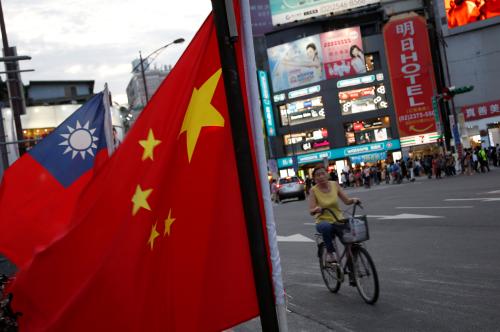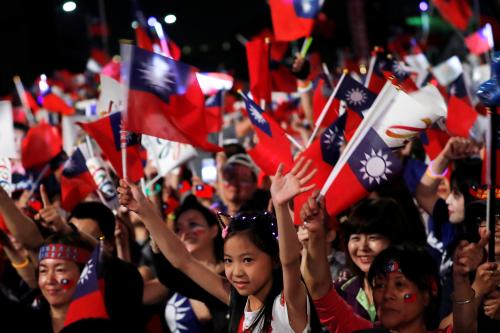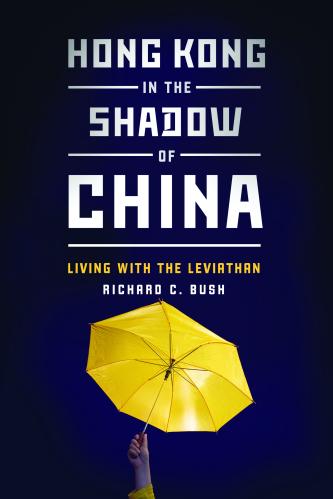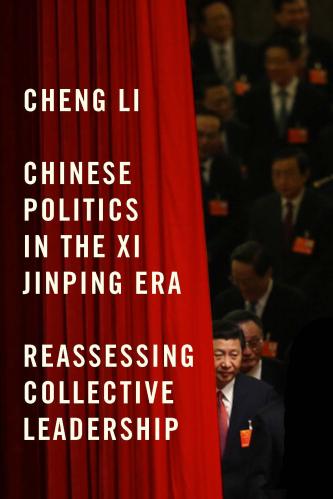Over the past three years, Beijing has unrelentingly squeezed Taiwan, writes Ryan Hass. Ultimately, the daunting challenges Taiwan confronts are as much psychological as strategic. This piece originally appeared in the Taipei Times.
These are not easy times for allies and partners that rely on security protection from the United States. President Trump has taken a wrecking ball to the bedrock principle that America’s word is its bond.
Trump has sought to leverage American security commitments to extract better terms from partners on issues ranging from trade to host nation funding for American troops. He has turned a blind eye to North Korea’s testing of missiles that threaten America’s allies. He has responded with a shoulder shrug to an attack on a Saudi Arabian oil refinery. He allegedly has withheld military aid to Ukraine in order to pressure Kyiv to meet his demands for compromising information on a political opponent. And he has sold out Kurdish fighters who fought valiantly alongside American troops in Syria in order to garner goodwill with Turkey’s autocratic leader, Recep Tayyip Erdoğan.
While many of these developments occurred far from Taiwan’s shores, they all likely strike a nerve, given the growing threat the mainland poses.
Over the past three years, Beijing has unrelentingly squeezed Taiwan. It has intensified military operations, including by sending fighter jets across the center line of the Taiwan Strait for the first unambiguously deliberate time in decades. It has poached diplomatic allies. It has locked Taiwan out of international organizations where it previously was able to participate. It has frozen channels of cross-Strait communication.
And it reportedly has been engaging in an election influence campaign. Beijing’s rationale for this escalation of pressure — that President Tsai (蔡英文) has not met its unilateral preconditions for engagement — is neither justified nor constructive.
Each political camp in Taiwan emphasizes different aspects of the threat from the mainland. Even so, both sides agree that the challenge from the mainland to Taiwan’s political, economic, and social systems is intensifying.
Such concerns in Taiwan have been amplified by events in Hong Kong. The deterioration of social order in Hong Kong has rendered hollow President Xi’s (習近平) invocation in his January 2 speech for the “one country, two systems” approach to apply to Taiwan. No politician in Taiwan now could reasonably advocate for such an outcome, given the available evidence of how such a system works in practice in Hong Kong.
Although the present snapshot of Taiwan’s situation certainly looks troubling, I still believe there are good reasons to resist impulses toward drawing dark conclusions about Taiwan’s future. Here’s why:
- First, despite its recent setbacks, the United States still maintains the most capable fighting force in the history of humankind. Beijing certainly understands this fact.
- Second, Taiwan enjoys strong support in the United States Congress, in the American policymaking community, and across the United States. This support is undergirded by the nearly 400,000 jobs that exist in the United States as a result of trade and investment with Taiwan.
- Third, even if President Trump is unorthodox, the American people remain pragmatic. A recent survey by the Chicago Council on Global Affairs makes clear that the American people continue to support US security alliances, free trade, promotion of democracy and human rights, and a leading role for the United States in global affairs. These sentiments at some point will guide the American policy pendulum back toward a more stable resting place.
- Fourth, Taiwan is a vibrant, dynamic society and economy located in the heart of the fastest growing region in the world. With a highly educated and hard-working population, a strong innovation base, and access to substantial capital, Taiwan is poised for future economic growth.
At the end of the day, the daunting challenges Taiwan confronts are as much psychological as strategic. While it is impossible to eliminate the possibility that Beijing will pursue a military solution to compel unification, there are still ample reasons for Beijing to defer such a profound decision, as long as Taiwan refrains from pursuing de jure independence.
Among them, nobody in the PLA can assure the top leadership in Beijing that such a mission would achieve success, and the top leadership cannot have confidence in the continued survival of the Chinese Communist Party if a military operation achieves anything less.
Additionally, Beijing has many other tools short of threat or use of force to seek to influence Taiwan. Also, many in Beijing continue to believe time is on its side, as the gap in relative power continues to grow in the mainland’s favor.
The people of Taiwan will need to steel themselves for the possibilities of both coercion without violence, as well as the threat of force. Determined efforts will be needed to strengthen Taiwan’s belief in itself, to trust the resilience and inherent wisdom of Taiwan’s democratic model, and to keep faith in the bonds that bind Taiwan with its friends.
To paraphrase the immortal words of Winston Churchill, the people of Taiwan will need to have full confidence that if all do their duty, if nothing is neglected, and if the best arrangements are made, Taiwan will be able to ride out the storm, if necessary for decades, until a peaceful resolution that reflects the will of its citizens can be realized.







Commentary
Hold the faith on Taiwan’s future
October 23, 2019